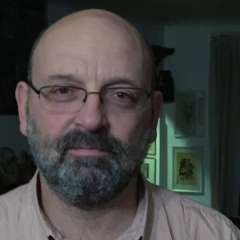Anticipating Leoš Janáček’s late-in-life creative explosion as an opera composer, his singular The Diary of One Who Disappeared received its premiere in Brno exactly a century ago. On Monday night, the Bayerische Staatsoper presented a rendition of it as part of its Montagsstücke, a series of Monday night streamed performances meant “to fill the lockdown months”.
Employing a “diary in poems”, published in a local newspaper, as a projection of the composer’s hopeless infatuation with the much younger Kamila Stösslová, the Diary is a song cycle following a tradition going back to Beetheven’s An die ferne Geliebte. The 22 numbers are not only linked, but their bond translates into a fully-fledged narrative that can be summarised as the story of a young country boy who meets a gypsy girl, Zefka, in the woods, becomes obsessed with her and decides to break free from the confinements of his previous life and follow his mistress. Hence, various directors have decided that the cycle has the attributes of a chamber opera and there have been multiple attempts to stage it, including the well-travelled version put together by Ivo van Hove.
In Munich, Friederike Blum – credited for “szenische Einrichtung” (stage set-up) – had split a raised platform into two. One half, austere, was inhabited by the excellent Robert Pechanec at the piano. The other one depicted Janíček, our hero, sitting at a table with a white cloth, admiring a pot full of grass (or is it “ripening wheat”?). Soon enough, he furiously plucks it before binding his eyes with the snatched tablecloth and launching himself into the invisible woods where Zefka is. She is never shown close to her lover, seeming to be just an image in a dream. The three remote singers (Sarah Gilford, Mirjam Mesak and Yajie Zhang) describing the seduction scene are – according to the composer’s own indications – “almost inaudible”. After Zefka’s image vanishes, the young peasant returns to himself. The cloth is back on the table. At the very end, in his quest to reach the golden light of happiness or, maybe, “the dancing glow-worms” mentioned earlier in the text, our Janíček climbs over several rows of seats in the Nationaltheater’s stalls... Janáček clearly encouraged – via the simple stage directions he provided – a theatrical approach. Nevertheless, one had the impression here of exaggerations that did not necessarily augment the work’s impact. On the contrary, they detracted a public watching from afar from focusing on the marvellous music that is both a meditation on a soul’s tribulations and a description of a whimsical world full of magpies, swallows and “the sweet smell of ripening wheat”.
As the protagonist, Slovak tenor Pavol Breslik had no difficulties in rendering the intricacies of Janáček’s vocal idiom, shaped by Moravian folk music and speech patterns. Despite some hesitations in the upper register, his voice still sounds youthful, hence suited for role. He wholeheartedly sang the lyrical intermezzo in “Hey, you green oxen” and the brief “The shady elder grove”. However, he was not always convincing in portraying the plight of a soul torn between frustration and elation, between his love for an outsider – sure to be rejected by the community – and the duty towards his family. The cycle’s hero is a post-Freudian creature whose torments are quite different from those of Tamino or Don Ottavio, the opera characters with which Breslik is mostly associated. Zefka – “her dark eyes glowing like a spark”, a substitute for the composer’s beloved Kamila – appears only in three central numbers. Daria Proszek, not favoured by the stage direction, still captured the listeners’ attention with her seductive, siren-like mezzo (“God in heaven, eternal one”).
As the other “narrator”, the piano is as important a character in The Diary as the tenor, rarely just accompanying the voice. Pechanec’s playing, precise and understated, brought forward Janáček’s distinctive brand of modernism, full of lyricism and unpredictable harmonies.
This performance was reviewed from the Bayerische Staatsoper video stream




